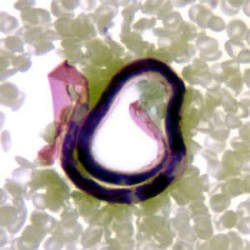Scientists have determined the way an anti-parasitic drug kills the Brugia malayi worms (illustrated right) brought on by the filarial diseases river blindness and elephantiasis, a discovery that took decades of research. The diseases afflict about 140 million people worldwide, doing much of their damage in equatorial Africa.
Charles Mackenzie, a professor of veterinary pathology at Michigan State University in East Lansing and one of the researchers on the project, calls the drug Ivermectin, “one of the most important veterinary and human anti-parasitic agents ever.” Ivermectin works by killing the first stage of the worm in the human body, and also appears to paralyze the reproductive tract of the adult female worms, stopping reproduction of new parasites.
The new research indicates that the drug prevents the worm from secreting proteins through a pore in its mid-body, by binding to receptors at the pore and blocking the secretions. It is the secretions that normally block a person’s ability to attack and kill the worm, but after the drug prevents these secretions, the host’s own immune system is able to attack and kill the parasites.
Elephantiasis (lymphatic filariasis) is caused by tiny worms spread via mosquitoes and results in severe swelling of the legs, arms and torso. River blindness (onchocerciasis) is spread by black flies, and after the worms die in a person’s eye, they can cause blindness and debilitating skin disease.
The findings appear in the current edition of the Proceedings of the National Academy of Sciences (paid subscription required).
* * *


 RSS - Posts
RSS - Posts
You must be logged in to post a comment.